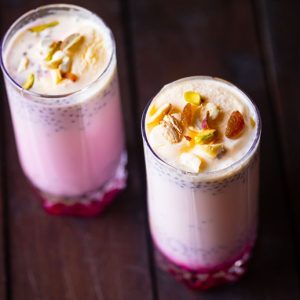The globally famous art of Madhya Pradesh combines its expertise with the daily life of the tribals. The pastoral people, their faith, and their emotion are beautifully represented by these painting.
The painting shows the various festivities of the region. This is not just any decoration piece, the paintings hold a religious root in them. The paintings are the primal art of Madhya Pradesh. The various paintings on the caves make this an evident fact that they are as old as human beings.
Basically, these paintings were brushed by tribals to keep the evil at bay. There are different painting flairs of different tribes of Madhya Pradesh.

Pithora paintings pictures the myths of the human was created. These are made by the Bhilala tribe of Pradesh. Images of daily objects, daily chorus and animals like horses, elephants etc. are generally depicted by the painting.
The Different Types of Folk Paintings in Madhya Pradesh
The folk painters of Bundelkhand have a flair for ritualistic and auspicious wall paintings and floor decorations. Ceremonial decorations in flour are also made on almost all auspicious occasions. These days the paintings are also made on paper and boards.
They have drawings of different gods and goddesses like Maha Laxmi, Durga Mata etc and these are also done on different occasions like Ashtami, Saptami, Radha Astami, Sanjhi, Karwa Choth, Bhai Dooj, Deepawali, Ekadashi, and Makar Sankranti etc. the colour patterns and schemes are changing from theme to theme. And are essentially dependent on traditional beliefs, conceptions and faiths.
These handicrafts are quite famous in Delhi. However, they are usually made for commercial purposes.

The History and Symbolism of Folk Paintings in Madhya Pradesh
The malwa folk painting is aesthetic in their basic nature. The painting is only created for any occasion depending on ritual or festival.
Usually done on floors or walls, these paintings are called traditional paintings. The material used for these paintings are chalk powder, colored chalk powder, chalk paste, turmeric and saffron paste on Deepawali (Diwali) etc.
The paintings made by Chiteras are called Chitravans and are famous for door decoration, mythological characters, and religious figurines. These paintings are done using bright colors like red, blue, green and yellow etc.

The Techniques Used in Folk Painting
Traditional brushes used in these paintings are made from a cotton ball attached to any stick. The motifs drawn in the paintings are flowers, swastika, animals and birds.
The designs consist of dots, lines, triangles, squares and circles. This art form is passed on from generations, the women of the household practice this art form and then their daughters are taught.
The paintings are wiped down and are drawn again with the change of festivities.
The Cultural Significance of Folk Paintings
Few examples of such paintings are paintings of snakes during Nag Panchami, Lord Krishna during Janmashtami, Painting of God Ganesha and goddesses Laxmi during Deepawali. During weddings, gobar wall paintings, floral patterns, jhumar, oil lamps, and other auspicious symbols are made.
There is another kind of painting called Mandana Paintings which are from regions Malwa Nimar and Tanwarghar. These are famous wall and floor paintings. Mandana Paintings are made with a mixture of red clay and cow dung as a base and then painted with white color.
These paintings are world famous for their exceptional choice of colors and themes. The styles of these paintings are known as either Patua or Chitravan. These paintings are exported all across the world and are frequently exhibited in Japan, France, Australia, USA and other countries.
You can buy these folk paintings from MP State Emporium, GTB Complex, TT Nagar in Bhopal and in Indore at MT Market and Handicrafts Emporium.



